Legends of Nedaria
A Review by Kingston C. Rockwell
Download
Here

Once upon a time, there was a small girl...
So, a year ago today, for the December 2008 issue (or really any issue
after it), I was supposed to write a review for Thella. It
never happened and that is completely my fault. I was gonna try to
write one for this issue as a sort of anniversary to my original
failure, but NeoSpade has since remade the game and released it as Legends
of Nedaria. So how do the two compare?
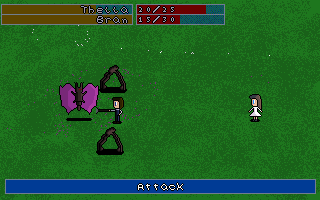
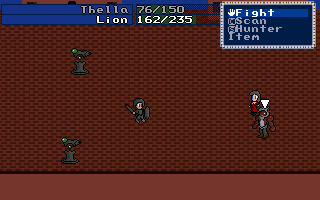
The first thing you'll notice is the new graphical style. Most notable
in the battles, where there's a lot more detail compared to Thella's
rather, well, blobby sprites. The tiles look a little simpler, and the
map design's nothing to write home about. The dungeons are full of
forked paths, but are ultimately annoying to explore for reasons we'll
get into later.

The differences get more interesting as you look at the changes made to
the story. Legends of Nedaria doesn't play like a remake of Thella
so much as a sequel. It takes place a number of years later,
growing outward from where we left Thella at the end of the first demo,
one could assume things happened much the same way and she grew up to
be the pirate she is in the later game. The events in Thella
are never fully touched on so much as hinted at or referred to, so Legends
of Nedaria's story doesn't stand on its own as well.
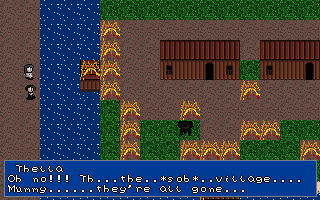
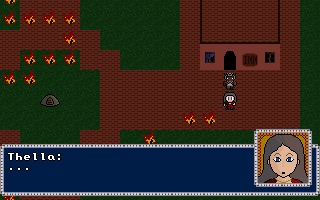
Moreover, the two stories have very different approaches. Thella's
thirty-minute demo took a lot of time to set up a story of two lands
caught in war, showing the story from both sides. NeoSpade was a little
hard on it for being so story-heavy when
he wrote his own review for it, but I thought it had a lot going
for it and would've been interesting to see how it progressed. Besides,
set up is to be expected at the beginning of a story.
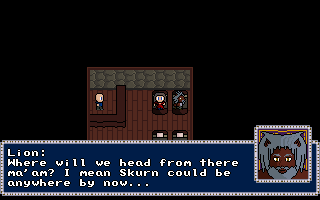
Nedaria perhaps swings the pendulum a little too far in the
opposite direction by giving you exactly as much information as you
need to get to Point B and little else. We know Thella's after Skurn to
exact revenge, but we don't know for what. Everyone else's
involvement from there feels shallow, whether they share her goal or
had little better to do. The whole thing feels aimless. There's so
little going on story-wise that it's hard to get attached to any of the
characters, and the jump that creates from apathy to antipathy ends up
being a small one. They feel like little more than ciphers and when the
player isn't hanging on to find out what happens to the characters
next, they have little reason to tolerate a game's bigger flaws.
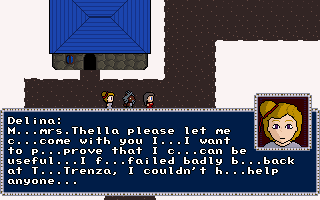
And the biggest flaws you'll run into in this game will be the part
you're spending 75% of your time on, dungeon-crawling and fighting
random enemies. If that sounds bland already, it only gets worse. Thella
had tough battles already, due to the small amount of HP given at the
start, but after taking a few careful randoms you'd gain enough levels
to survive without too much trouble, and you'd either win or die within
a couple rounds anyway. Nedaria starts you out fairly well on
HP, but enemies deal enough damage that you won't usually have much
time to rest on your laurels because of it. Not only that, but the
number of rounds it'll take to kill a single enemy is staggering, and
makes battles a huge chore to slog through.
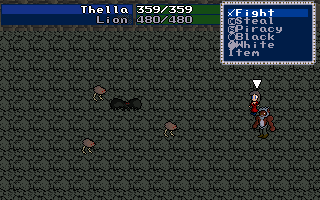
Legends of Nedaria is, in many ways, a test of endurance. It has
a very stingy view of resource management that comes through in many
aspects. For instance, non-human enemies, the ones you'll be fighting
for most of the game, especially through dungeons, give you no money. I
get it, yeah, there's no reason monsters would carry money since
they're not likely to visit the shops, but some conventions exist for a
purpose, and that purpose needs to be fulfilled elsewhere if you cut
out the convention. Nedaria left that one on the cutting room
floor, and the player suffers with no reliable source of income. No
reliable source of income amounts to no means to buy any of the run
potions, weapons, spells, or much-needed armor (have you seen
the Def ratings on the characters?) all the shops are stocked with, all
at unmanageable prices. The most efficient way to keep potions in stock
is by stealing them from enemies, but in practice this is both tedious
and dangerous, remarkably at the same time. Worse still, the non-human
enemies, which are leagues tougher than the humans, give absolutely piddly
amounts of EXP, making what is already an exercise in frustration an
outright insulting endeavor. I'd have half a mind to avoid them
altogether if that wouldn't lead to falling even further behind
the difficulty curve.

MP is another issue, as most characters will have a number of attacks
demanding it, but it, too, is in short supply. If you're like me,
you'll probably end up ignoring most of the Black/White spells, since
there are other things you'll need to use your limited finances on, but
among those you'll find lying around is included a heal spell that's
consistently weaker than the weakest potion, at an MP-cost higher than
your more useful skills. The game plays with the classic elemental
skillset, Fire/Earth/Ice/Lightning, but you won't have the money to buy
them all or the MP to test their effectiveness on many on your foes,
most of which will give you no indication where their weaknesses might
lie. Most of the White spells give no description of their application
beyond their names, even when used. You're better off sticking with
each character's default skills, if even those, since they won't last
you long, and you likely won't have the MP you'll need for the
inevitable boss. Save points, which thankfully tend to be scattered
throughout dungeons, will restore your HP/MP for a flat fee of 50 Dou,
but I've already covered the money thing.
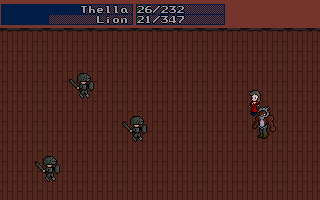
There's also an item you can steal from the second boss that's supposed
to raise dead heroes with 3/4 of their life, but it was never connected
to the relevant attack. A few other problems I didn't have room to
mention earlier are the auto-timed textboxes that always seem to run a
little too quick and the way every minor cutscene took control of your
character. Losing agency and any chance to prepare before you go into a
battle, major or minor (they it often did so for both), is a huge
bother in a game that regularly leaves you crawling into town at
critical health.
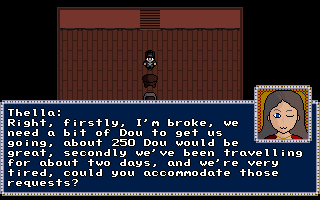
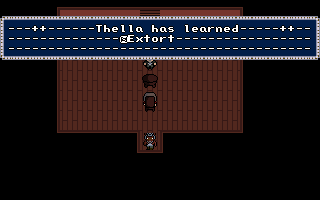
There were things I did like. The event-based skill-learning
was something I'd like to see more often, for one. The music was all
original, and its fuzzy MIDI-style really fit with the rest of the
game, as well as the sound effects. The game was longer than I expected
it to be, about two and a half hours at the point I gave up. The
portraits go a long way to enhancing the (in dire need of proofreading)
dialogue, though the smiley bubbles in Thella had their own
unique charm. There was clearly a lot of effort put into this game, I
jut feel a little bad asserting that it might've been put in the wrong
direction. I really thought Thella showed some potential, it's
really a shame Legends of Nedaria didn't tap into much of it.
I'll try to say something in a more timely manner next time.















